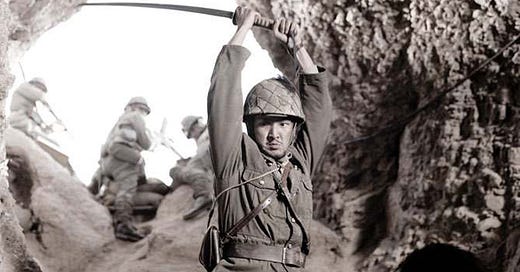Heroes of the Zeroes: Letters From Iwo Jima
Heroes of the Zeroes is a daily, alphabetical look back at the 365 best films of 2000-2009.
"Letters From Iwo Jima" Rated R 2006
Clint Eastwood excels at circumstance over pomp, so it was hardly a shock that the somber “Letters From Iwo Jima” — a Japanese-language companion to Eastwood’s star-spangled “Flags of Our Fathers” — proved the better of his 2006 films.
Salutatory sentiments for America’s World War II soldiers will forever retain a value in honoring valor, but “Flags” found nothing new down that trodden cinematic trail.
Forceful when fulminating violence’s futility, Eastwood boldly met a challenge of portraying Japanese soldiers as more than act-of-war antagonists.
In the first U.S. film to dramatize WWII solely from an enemy perspective, Eastwood and screenwriter Iris Yamashita remarkably straddled a line of vilification and lionization. Depicting Iwo Jima’s desolation and the Japanese soldiers’ doubts demanded a color palette dimmed to sepia when not drained altogether, and Kyle Eastwood and Michael Stevens’ score underscored minor-key mourning.
While some Japanese commanders ludicrously established kill quotas, soldiers prepared less for battle and more for their demise — tunneling caves that became graves on a rock then devoid of strategic value or citizens to protect.
Swiftly and fatally, this death-shroud despair spreads among the men, led by the pragmatic Gen. Kuribayashi (Ken Watanabe). Inside the caves when America lands, young soldier Saigo (Kazunari Ninomiya) navigates a hellish gauntlet of violence and expectations to sacrifice himself for a “noble” death.
Modern-day echoes of being snookered into a bad war weren’t lost on Eastwood, and “Letters” delivered an overwhelmingly powerful eulogy for the death of righteousness in combat on either side of the line.



